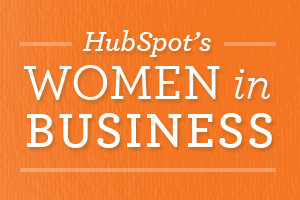 Editor's note: March is Women's History Month, and to celebrate we have asked HubSpotters to write brief tributes to women they admire. We will publish these articles all month here on the HubSpot Opinion blog as part of a series called "Women in Business." Here, my colleague Rosalia Cefalu pays tribute to Pattie Maes, an award-winning MIT professor and human-computer interaction specialist. -- Dan Lyons.
Editor's note: March is Women's History Month, and to celebrate we have asked HubSpotters to write brief tributes to women they admire. We will publish these articles all month here on the HubSpot Opinion blog as part of a series called "Women in Business." Here, my colleague Rosalia Cefalu pays tribute to Pattie Maes, an award-winning MIT professor and human-computer interaction specialist. -- Dan Lyons.
I work on the Product Marketing team at HubSpot, helping to bridge the gap between the vision and functionality of the software we build and the people who use it. As you might expect, I am obsessed with the notion of humans and computers working together. One day I will live my cyborg dream, but until then I will continue to follow the work of my Women in Business nominee.
When I’m not at HubSpot I’m usually following Justin Timberlake and his music, or making music of my own. You can find me oversharing 7 days a week on Twitter @RosaliaCef.
My Nominee: Pattie Maes
 Pattie Maes is an award-winning MIT Professor and founder of the MIT Media Lab Fluid Interfaces group. A specialist in human-computer interaction, Maes is considered one of the founders of modern-day artificial intelligence.
Pattie Maes is an award-winning MIT Professor and founder of the MIT Media Lab Fluid Interfaces group. A specialist in human-computer interaction, Maes is considered one of the founders of modern-day artificial intelligence.
In the late 90’s, she helped build the innovative “Firefly,” originally a music recommendation engine which ultimately served as the original personalization engine behind barnesandnoble.com, ZDnet, and MyYahoo.
Maes paved the infrastructure on which many of today’s most well-known digital services are built upon (think Pandora, Amazon, and Netflix.) She believed that software (referred to then as “agents”) could learn the preferences of humans over time through programmed artificial intelligence in order to better serve them the personalized content and communities they’re looking for.
In a 1997 interview, Maes described a vision of AI that is not the one Hollywood depicts of robots banding together against humans. Instead, when our various software agents work together, they actually can be more helpful to humans.
If agents could integrate to share information about our behavioral patterns across different digital environments, they’d be able to aid us as whole humans, not a user spread across different machines and services. Sound like any modern-day software movements you may have heard of?
Maes has demonstrated an incredible ability to not only foresee the infrastructure of our digital future, but to actually build it. Thank you, Pattie.
Originally published Mar 13, 2014 11:02:31 AM, updated January 18 2023
Don't forget to share this post!
Related Articles
Expand Offer
